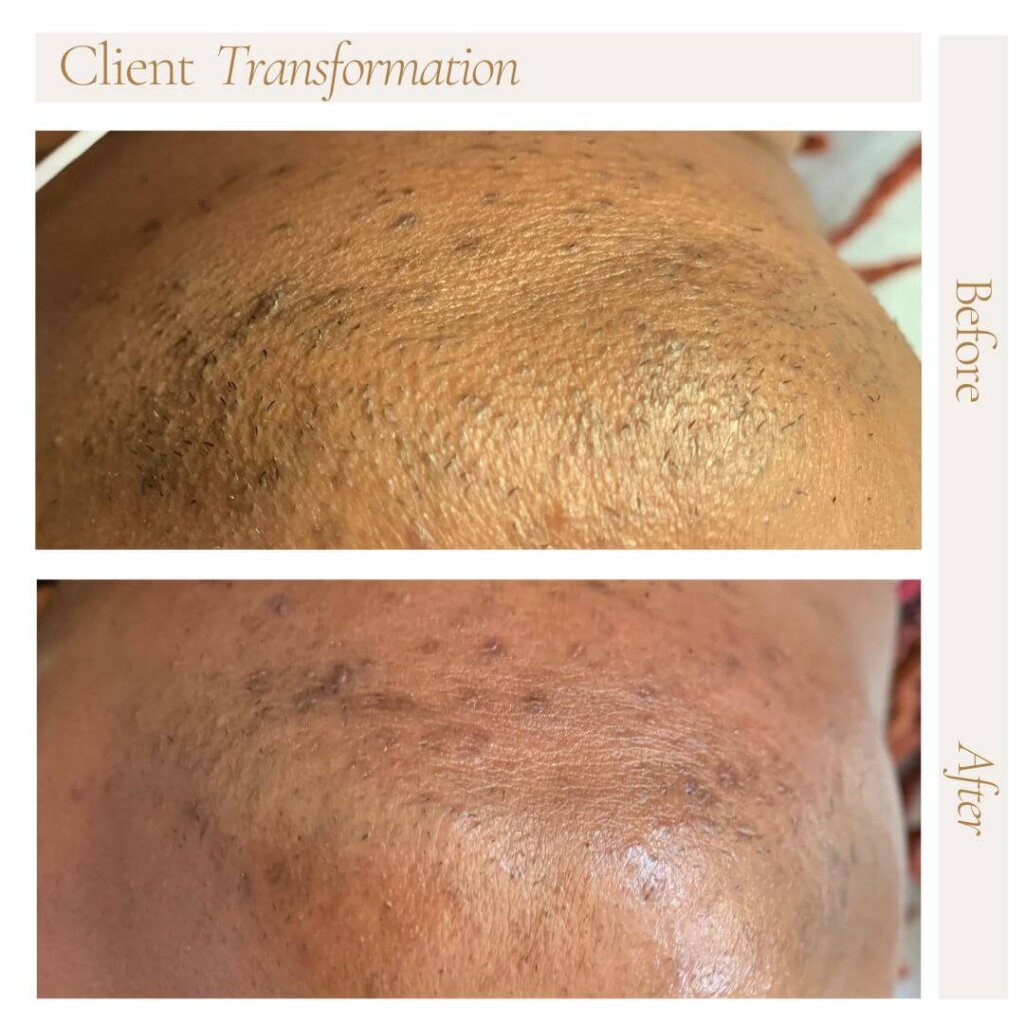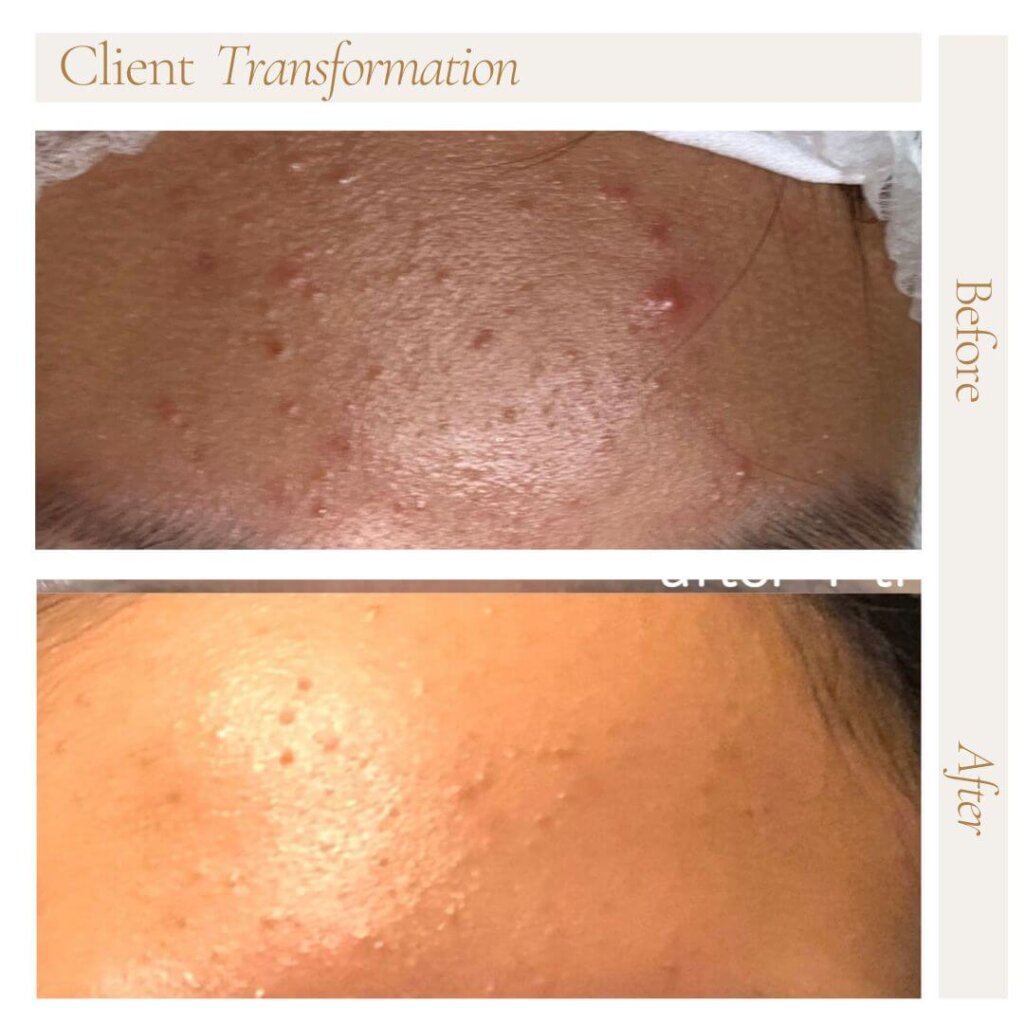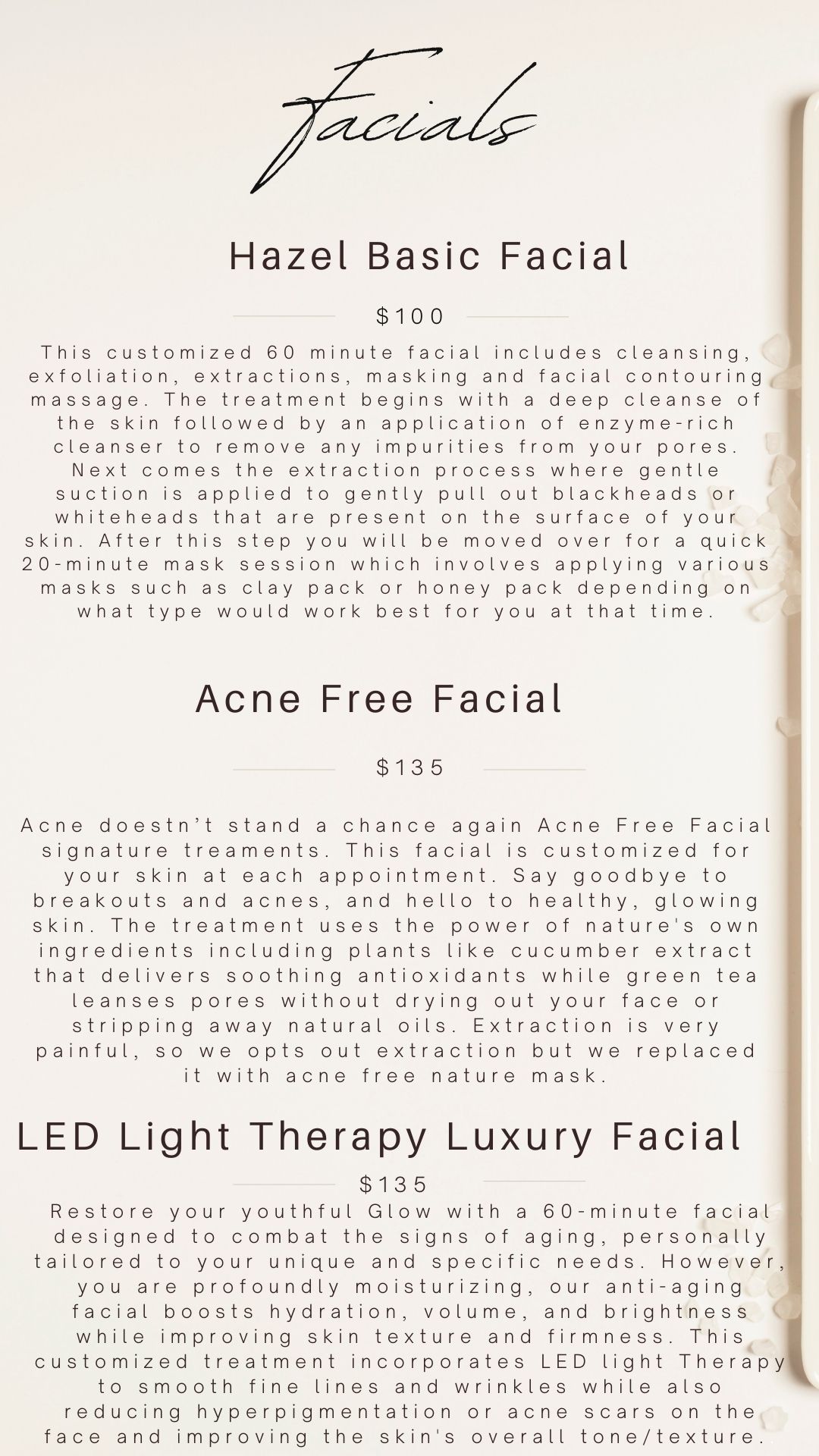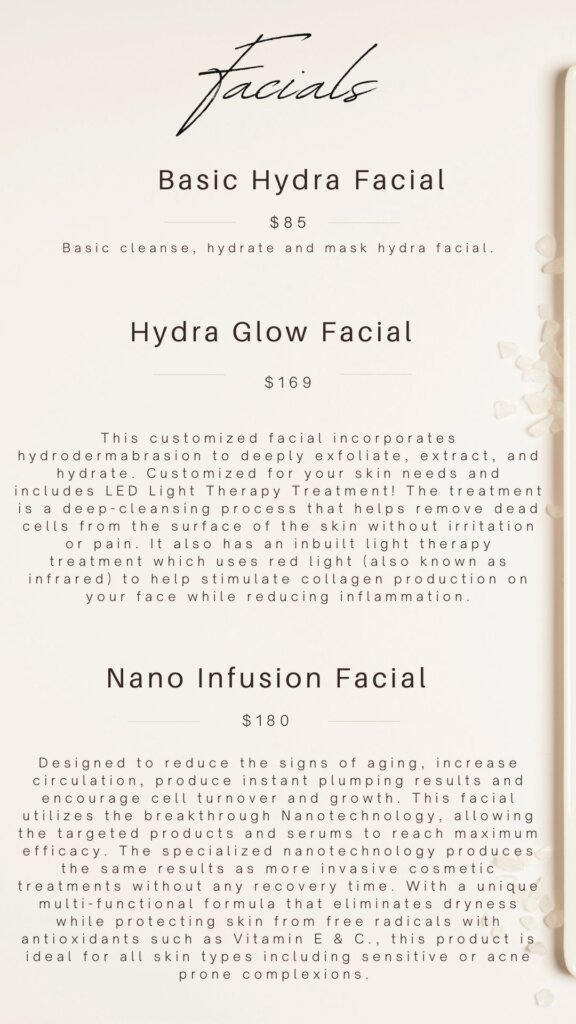ACNE FACIALS SEVERNA PARK
OUR CASE STUDY


Get Clear, Beautiful Skin with Acne Facials in Severna Park
What acne is, and why it’s a common problem?
All ages are of all ages is vulnerable to acne, but it happens most often in adolescence. Pimples, blackheads, and whiteheads form because the hair follicles become clogged with oil and dead skin cells. Numerous factors, including heredity, hormones, stress, and food, can contribute to acne. A specific form of facial treatment called an acne facial is intended to help clear up acne-prone skin. They might involve various methods and materials, such as cleaning, exfoliation, extraction, and the use of masks and serums, and usually are carried out by a skilled esthetician.
Causes of Acne
Acne is a common skin disorder that develops as pimples, blackheads, and whiteheads when hair follicles become clogged with oil and dead skin cells. Although acne can appear at any age, it is typically linked to puberty because of hormonal changes.
Several causes, such as heredity, excessive oil production, and germs on the skin, bring on acne. But the onset and severity of acne are also influenced by nutrition and lifestyle. For example, dairy products and foods high in sugar have been related to acne outbreaks, while stress and sleep deprivation can worsen acne symptoms.
Hormonal changes can also bring acne, especially during adolescence and menstruation. Acne outbreaks, excessive oil production, and plugged pores might result from the rise in androgen hormones at these times. Adult hormonal imbalances can also result in acne, especially in women with diseases like polycystic ovarian syndrome (PCOS).
Benefits of Acne Facials
Acne facials can benefit the skin in a variety of ways. First, they can provide a deep wash to get rid of contaminants, dead skin cells, and extra oil, which will enhance the texture of the skin overall. This may result in a smoother, more even skin surface, which may aid in reducing the visibility of acne scars. The potential of acne facials to lessen skin irritation and redness is another advantage. This is accomplished by employing specialist remedies and procedures to calm the skin and ease inflammation. This can make the skin look better overall, making it appear younger and more luminous.
Who is an Acne Facial Best For?
Many people can benefit from acne facials, especially those who struggle with acne-prone skin. Acne facials are also beneficial for those with oily skin since they control the production of oils and reduce shine. Acne facials can also help those with blocked pores or blackheads, as they can unclog pores, eliminate pollutants, and stop subsequent breakouts. Acne facials are also beneficial for those with hyperpigmentation, scarring, and uneven skin texture since they enhance the overall look and health of the skin. A certified esthetician or dermatologist should be consulted to ascertain whether an acne facial suits your skin type and condition.
How Often Should You Get an Acne Facial?
It is recommended to get an acne facial every four to six weeks to maintain the health and appearance of your skin. Consistency is vital because it takes time to see results, and regular treatments can help prevent future breakouts. However, the frequency of acne facials may vary depending on factors such as age, skin type, and severity of acne. Therefore, it’s best to consult with a licensed esthetician to determine the optimal frequency of acne facials for your individual needs.
Preparing for Your Acne Facial
Before your consultation, it’s crucial that you avoid using certain products and treatments that could irritate your skin. Retinoids, exfoliating scrubs, and chemical peels belong in this line of products.
Ensure to thoroughly cleanse your skin the day before your visit , remove any dirt or oil that may have collected inside.
Avoid wearing makeup to your session, as it may affect how your therapy is administered.
Ensure that you are dressed comfortably to unwind during the treatment.
Be on time: By being early, you can ensure adequate time for your appointment and treatment.
Your esthetician will examine your skin at the beginning of your visit and review any issues you may have. After that, they will carry out several procedures to thoroughly wash, exfoliate, and moisturize your skin. This might entail the application of a facial mask, steam, and extractions. Your esthetician will advise you on how to preserve the health and appearance of your skin after your procedure.
Aftercare for Acne Facials
After an acne facial, it’s essential to take proper care of your skin to maintain the benefits of the treatment and avoid potential side effects. Here are some aftercare tips:
- Use gentle products: Your skin may be sensitive after an acne facial, so avoid using harsh products for at least a day or two. Instead, stick to gentle cleansers, moisturizers, and other products that won’t irritate your skin.
- Avoid sun exposure: Your skin may be more sensitive to the sun after an acne facial, so staying out of direct sunlight for a few days is essential. If you need to be outside, wear a broad-spectrum sunscreen with an SPF of 30 or higher.
- Don’t pick at your skin: It can be tempting to pick at any remaining pimples or blackheads, which can cause further irritation and even scarring. Instead, let your skin heal on its own.
- Stay hydrated: Drinking plenty of water can help keep your skin hydrated and healthy, improving the results of your acne facial.
- Follow your esthetician’s advice: Your esthetician will likely provide specific aftercare instructions, so follow them closely.
As with any skincare treatment, there is a small risk of side effects after an acne facial. These can include redness, dryness, and mild peeling. If you experience any of these side effects, don’t panic – they should subside within a few days. You can apply a cool compress to your skin or use a gentle, fragrance-free moisturizer to manage any discomfort. If you have any concerns about the side effects of an acne facial, be sure to talk to your esthetician.
Combining Acne Facials with Other Treatments
Acne facials can improve the overall outcomes of your skin care regimen when used in conjunction with other treatments. Microdermabrasion, chemical peels, and LED light therapy are a few procedures that are frequently used with acne facials. Microdermabrasion is a non-invasive procedure that removes dead skin cells from the top layer of the skin, leaving it smoother and more radiant. A more complete and efficient treatment for acne can be achieved by combining microdermabrasion with an acne facial to help clean out clogged pores and eliminate impurities.
Another choice is combining a chemical peel with an acne facial. A solution that exfoliates and resurfaces the skin is applied during these procedures to lessen the appearance of fine lines, wrinkles, and hyperpigmentation. Chemical peels can enhance skin texture and reduce the visibility of acne scars when used with an acne facial. Different colored lights are used in LED light therapy, a non-invasive procedure, to target particular skin issues. Red light can aid in reducing inflammation and promoting healing, while blue light is frequently used to treat acne by eliminating the bacteria that cause outbreaks.
Combining LED light therapy with an acne facial can help enhance the treatment’s overall results, leaving your skin more apparent and radiant.
When considering combining acne facials with other treatments, it is essential to consult with a skincare professional to determine the best combination for your skin type and concerns. They can recommend the most appropriate treatments to achieve your desired results and ensure they are spaced appropriately to avoid over-treating the skin.
In conclusion, persons who struggle with acne-prone skin, greasy skin, clogged pores, and blackheads can benefit from acne facials as a treatment. Acne facials can enhance skin texture, relieve inflammation, and give a brighter complexion by addressing the underlying causes of acne and offering a deep cleansing. However, getting the most out of an acne facial is crucial by preparing your skin beforehand, adhering to the correct aftercare procedures, and avoiding activities that might worsen your skin. Additionally, combining acne facials with other systems like chemical peels or microdermabrasion might increase their advantages and provide even better outcomes.
Make an appointment with a spa in Annapolis immediately if you’re prepared to benefit from an acne facial. You may obtain healthier, brighter, and more beautiful skin with regular treatments and good skincare.
Frequently Asked Questions
- An acne facial is a specialized treatment designed to help clear and prevent acne breakouts. It typically involves deep cleansing, exfoliation, extractions, and products targeting acne-prone skin. In contrast, a regular facial may focus more on general skin maintenance and may not include targeted treatments for acne.
- While acne facials can be helpful for mild to moderate acne, severe acne may require more intensive treatment from a dermatologist. Therefore, it’s essential to consult with a skincare professional to determine the best treatment for your individual needs.
- Acne facials should not be painful, but some people may experience mild discomfort during extractions. Your esthetician should be able to adjust their technique to minimize any discomfort.
- It’s generally recommended to avoid wearing makeup for at least a few hours after an acne facial to allow your skin to breathe and fully absorb any products used during the treatment. Your esthetician can provide more specific instructions based on the products and techniques used in your facial.
- It’s normal to experience some redness or irritation after an acne facial, primarily if extractions were performed. However, this should typically subside within a few hours to a day. Contact your esthetician or healthcare provider if you experience persistent redness, swelling, or other concerning symptoms.
- Results from acne facials can vary depending on the individual and the severity of their acne. Some people may see improvements in their skin immediately, while others may require several treatments before noticing significant changes.
- As with any skincare treatment, there are some potential risks and side effects associated with acne facials. In rare cases, these can include redness, irritation, dryness, and even scarring. Therefore, choosing an experienced esthetician and communicating any concerns or sensitivities before your treatment is essential.


